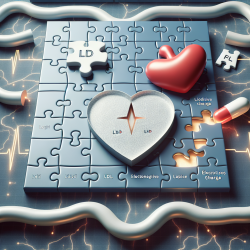Introduction
In the realm of mental health, the intersection of suicidal behavior and alcohol abuse presents a complex challenge for practitioners. The research article titled "Suicidal Behavior and Alcohol Abuse" offers a comprehensive analysis of this intricate relationship, providing valuable insights for professionals aiming to improve their therapeutic strategies. This blog post aims to distill the key findings of the research and suggest practical applications for practitioners, particularly those working with children and adolescents.
The Relationship Between Alcohol Abuse and Suicidal Behavior
The study highlights the significant role that alcohol abuse plays in exacerbating suicidal tendencies. Alcohol can lead to disinhibition, impulsiveness, and impaired judgment, which are critical factors in suicidal behavior. Moreover, alcohol is often used as a means to alleviate the emotional distress associated with suicidal ideation.
Practitioners should be aware of the dual role alcohol plays: it not only increases the risk of suicide through its physiological effects but also serves as a coping mechanism for individuals experiencing severe psychological distress. This dual role complicates the therapeutic approach, requiring a nuanced understanding of each individual's relationship with alcohol.
Implications for Practitioners
For speech-language pathologists and other mental health professionals, the implications of this research are profound. It underscores the importance of comprehensive assessments that include screening for alcohol use disorders, especially in clients with a history of depression or suicidal behavior. Here are some actionable steps practitioners can take:
- Screen for Alcohol Use: Regularly assess clients for alcohol use patterns, particularly if they exhibit signs of depression or anxiety.
- Integrated Treatment Plans: Develop treatment plans that address both alcohol abuse and mental health issues concurrently, recognizing the interplay between the two.
- Family Involvement: Engage family members in the treatment process to provide a support system and monitor alcohol use in adolescents.
- Education and Prevention: Educate clients and families about the risks associated with alcohol use and its impact on mental health.
Encouraging Further Research
While the study provides a robust foundation, it also highlights areas where further research is needed. Practitioners are encouraged to contribute to this body of knowledge by exploring questions such as:
- How do different patterns of alcohol consumption affect suicidal behavior across various demographics?
- What are the most effective intervention strategies for reducing alcohol-related suicides?
- How can speech-language pathologists play a more active role in suicide prevention efforts?
Conclusion
Understanding the link between alcohol abuse and suicidal behavior is crucial for developing effective prevention and intervention strategies. By integrating the insights from this research into their practice, speech-language pathologists and other mental health professionals can better support their clients and contribute to reducing the incidence of suicide.
To read the original research paper, please follow this link: Suicidal Behavior and Alcohol Abuse.










